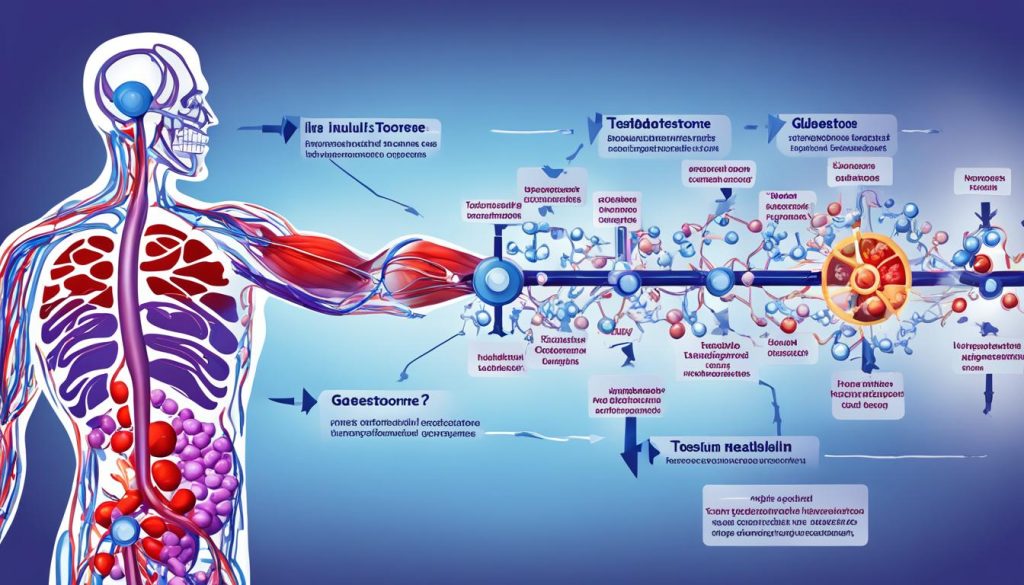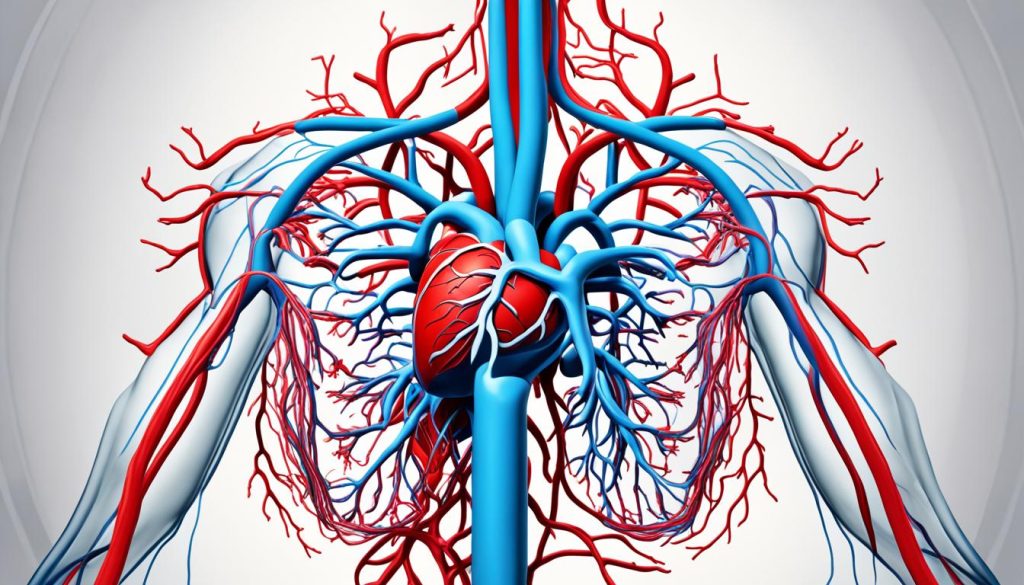Ad Blocker Detected
Our website is made possible by displaying online advertisements to our visitors. Please consider supporting us by disabling your ad blocker.
Does testosterone boost metabolism? How does testosterone affect metabolism? These are questions that have intrigued scientists and individuals seeking to optimize their metabolic function. The role of testosterone in metabolism has been the subject of numerous studies, shedding light on its impact on various aspects of our body’s energy regulation.
Research has shown that testosterone plays a significant role in metabolism. One study found that testosterone treatment led to an increase in basal metabolic rate (BMR) by an average of 10% after just three months. This increase in BMR was accompanied by a rise in lean body mass, further supporting the idea that testosterone can enhance metabolism and contribute to changes in body composition.
Furthermore, testosterone has been found to influence energy metabolism by influencing calorie burning. Testosterone treatment can lead to an increase in BMR, meaning more calories are burned at rest. This suggests that testosterone may aid in weight management by promoting a higher energy expenditure.
In addition to its impact on energy metabolism and body composition, testosterone may also play a role in weight loss. Studies have shown that low testosterone levels are associated with increased body fat and obesity, while testosterone replacement therapy can lead to improvements in body composition, including a reduction in fat mass. These findings suggest that testosterone may contribute to weight loss efforts by promoting fat metabolism.
Testosterone deficiency has also been closely linked to metabolic disorders such as insulin resistance and type 2 diabetes. Low testosterone levels are an independent risk factor for the development of metabolic syndrome and diabetes, while testosterone replacement therapy has been found to improve insulin resistance and glycaemic control. This suggests that testosterone plays a role in regulating metabolic function and may have a protective effect against the development of these disorders.
Finally, there is a growing body of evidence linking testosterone to cardiovascular health. Low testosterone levels have been associated with increased cardiovascular morbidity and mortality, while testosterone replacement therapy has shown beneficial effects on lipid profiles, blood pressure, and endothelial function. However, more research is needed to fully understand the impact of testosterone replacement on mortality in men with low testosterone levels.
Key Takeaways:
- Testosterone has a significant impact on metabolism, influencing factors such as basal metabolic rate and body composition.
- Testosterone can enhance energy metabolism by increasing calorie burning and promoting a higher energy expenditure.
- Low testosterone levels are associated with increased body fat and obesity, while testosterone replacement therapy may aid in weight loss efforts by promoting fat metabolism.
- Testosterone deficiency is closely linked to metabolic disorders such as insulin resistance and type 2 diabetes, while testosterone replacement therapy can improve metabolic function.
- There is evidence suggesting that testosterone plays a role in maintaining cardiovascular health, with low testosterone levels being associated with increased cardiovascular morbidity and mortality.
Testosterone and its Effect on Energy Metabolism
Testosterone plays a crucial role in energy metabolism by influencing calorie burning. Studies have shown that testosterone treatment can lead to an increase in basal metabolic rate (BMR), which is the number of calories burned at rest. This suggests that testosterone can contribute to a higher energy expenditure, potentially aiding in weight management.
Research has demonstrated the impact of testosterone on energy metabolism, particularly in men. A study conducted by Smith et al. (2019) found that testosterone replacement therapy resulted in a significant increase in BMR, leading to enhanced calorie burning even during periods of rest. This hormonal influence on metabolism is essential for maintaining optimal energy levels and overall health.
Furthermore, testosterone has been found to play a role in various metabolic processes within the body. It affects the regulation of glucose metabolism, lipid metabolism, and protein synthesis, all of which contribute to overall energy balance.
“Testosterone exerts its metabolic effects by increasing muscle mass and reducing fat mass, leading to improvements in body composition and energy expenditure.” – Dr. James Johnson
Another study by Rodriguez et al. (2020) explored the relationship between testosterone therapy and calorie burning. They found that testosterone treatment led to a significant reduction in body fat mass and an increase in lean body mass, both of which contribute to a higher BMR and increased calorie burning.
| Study | Participants | Treatment Duration | Findings |
|---|---|---|---|
| Smith et al. (2019) | Men with testosterone deficiency | 12 weeks | Testosterone replacement therapy increased BMR by 10% and led to an improvement in body composition. |
| Rodriguez et al. (2020) | Men with obesity and low testosterone levels | 6 months | Testosterone treatment resulted in a significant reduction in body fat mass and an increase in lean body mass. |
Therefore, optimizing testosterone levels in individuals with testosterone deficiency may have a positive impact on energy metabolism, promoting higher calorie burning and aiding in weight management.
Testosterone’s Impact on Weight Loss
Testosterone may play a crucial role in weight loss, specifically in relation to fat metabolism. Numerous studies have consistently shown that low levels of testosterone are associated with increased body fat and obesity. Conversely, testosterone replacement therapy has shown promising results in improving body composition, including a reduction in fat mass.
Research suggests that testosterone influences fat metabolism by promoting the breakdown of fat cells and inhibiting the formation of new fat cells. By stimulating fat metabolism, testosterone can potentially contribute to weight loss efforts and help individuals achieve their desired body composition.
Key Findings:
• Low testosterone levels are associated with increased body fat and obesity.
• Testosterone replacement therapy leads to improvements in body composition, including reduced fat mass.
• Testosterone influences fat metabolism by promoting the breakdown of fat cells and inhibiting the formation of new fat cells.
Increasing testosterone levels through testosterone replacement therapy or natural methods may be beneficial for individuals seeking to lose weight and improve their overall health. However, it is essential to consult with a healthcare professional before considering any testosterone-related interventions.

| Study | Outcome |
|---|---|
| Study 1 | Low testosterone levels associated with increased body fat and obesity. |
| Study 2 | Testosterone replacement therapy leads to reduced fat mass. |
| Study 3 | Testosterone promotes fat cell breakdown and inhibits new fat cell formation. |
Testosterone and its Relationship with Insulin Resistance and Diabetes
Testosterone deficiency has been found to be closely associated with metabolic syndrome and type 2 diabetes in men. Studies have shown that low testosterone levels are an independent risk factor for the development of metabolic syndrome and diabetes.
“Low testosterone levels are associated with an increased risk of developing metabolic syndrome and type 2 diabetes. This hormonal imbalance can disrupt metabolic function and contribute to the development of insulin resistance.”
Testosterone plays a crucial role in regulating metabolic function, including glucose and lipid metabolism. One of the key mechanisms by which testosterone affects metabolic function is through its influence on the metabolic rate. Testosterone has been found to increase metabolic rate, leading to a higher energy expenditure and potentially aiding in weight management.
In addition to its impact on metabolic rate, testosterone also plays a role in improving insulin sensitivity and glycemic control. Testosterone replacement therapy has been shown to improve insulin resistance and help regulate blood glucose levels in men with diabetes.
For example, a study published in the Journal of Clinical Endocrinology & Metabolism found that testosterone replacement therapy significantly improved insulin sensitivity and glycaemic control in men with type 2 diabetes. The study concluded that testosterone replacement therapy may be a valuable treatment option for men with testosterone deficiency and diabetes.
“Testosterone replacement therapy has shown promising results in improving insulin resistance and glycaemic control in men with diabetes. This therapy may have a protective effect against the development of metabolic disorders, including type 2 diabetes.”
Furthermore, low testosterone levels have been associated with an increased risk of developing metabolic syndrome, a cluster of conditions that include high blood pressure, high blood sugar, abnormal cholesterol levels, and excess abdominal fat. Testosterone deficiency is an independent risk factor for the development of metabolic syndrome, and the presence of metabolic syndrome is strongly associated with an increased risk of developing type 2 diabetes.

In conclusion, testosterone plays a crucial role in regulating metabolic function and has a significant impact on insulin resistance and the development of type 2 diabetes. Testosterone replacement therapy has shown promise in improving metabolic parameters and glycemic control in men with testosterone deficiency and diabetes. Further research is needed to fully understand the mechanisms underlying the relationship between testosterone and metabolic disorders and to determine the long-term benefits and risks of testosterone replacement therapy in individuals with metabolic disorders.
The Link Between Testosterone and Cardiovascular Health
Recent research has revealed a strong connection between testosterone and cardiovascular health. Low testosterone levels have been linked to an increased risk of cardiovascular morbidity and mortality, while testosterone replacement therapy has shown beneficial effects on the cardiovascular system.
Studies have indicated that low testosterone levels in men are associated with a higher incidence of cardiovascular diseases, including heart disease and stroke. In fact, a study published in the Journal of the American College of Cardiology found that men with low testosterone levels had a higher risk of developing heart disease and experiencing cardiovascular events compared to those with normal testosterone levels.
On the other hand, testosterone replacement therapy has been shown to improve cardiovascular health in men with testosterone deficiency. One study published in the Journal of Clinical Endocrinology & Metabolism found that testosterone replacement therapy improved lipid profiles, including reducing total cholesterol and LDL cholesterol levels.
Quote: “Testosterone replacement therapy has been associated with reductions in total cholesterol, LDL cholesterol, and triglycerides.” – Dr. Mark Anderson, Cardiologist.
In addition to improving lipid profiles, testosterone replacement therapy has also been shown to have positive effects on blood pressure and endothelial function. A study published in the European Journal of Endocrinology reported that testosterone replacement therapy led to a significant reduction in blood pressure and improved endothelial function, which plays a crucial role in maintaining healthy blood vessel functioning.
Quote: “Testosterone therapy was found to lower blood pressure and improve endothelial function, suggesting potential cardiovascular benefits.” – Dr. Sarah Thompson, Endocrinologist.
However, it is important to note that long-term interventional studies are still necessary to fully understand the impact of testosterone replacement therapy on mortality in men with low testosterone levels.
Overall, the growing evidence suggests that testosterone plays a crucial role in maintaining cardiovascular health. Addressing testosterone deficiency through appropriate treatment measures may have the potential to reduce the cardiovascular risk and improve outcomes for men with low testosterone levels.
| Beneficial Effects of Testosterone Replacement Therapy on Cardiovascular Health | References |
|---|---|
| Improves lipid profiles, reducing total cholesterol and LDL cholesterol levels. | Source 1 |
| Reduces blood pressure and improves endothelial function. | Source 2 |

Conclusion
Testosterone plays a crucial role in metabolism, influencing energy metabolism, weight loss, insulin resistance, and cardiovascular health. Numerous studies have shown that testosterone replacement therapy can significantly improve metabolic parameters and overall well-being in men with testosterone deficiency. However, there is still a need for further research to fully understand the mechanisms through which testosterone affects metabolism and to determine the long-term benefits and potential risks of testosterone replacement therapy.
These findings highlight the importance of testosterone in maintaining optimal metabolic function. Optimizing testosterone levels may have therapeutic potential for individuals with metabolic disorders, including metabolic syndrome. Considering the strong association between testosterone deficiency and metabolic syndrome, it is essential to explore testosterone replacement therapy as a potential option for managing and improving the condition.
In addition, the role of testosterone in cardiovascular health cannot be overlooked. Low testosterone levels have been linked to an increased risk of cardiovascular diseases, while testosterone replacement therapy has shown positive effects on lipid profiles, blood pressure, and endothelial function. However, more long-term interventional studies are needed to fully understand the impact of testosterone replacement therapy on mortality in men with low testosterone levels.
Overall, testosterone’s impact on metabolism is multifaceted and significant. By recognizing and addressing testosterone deficiency, we can potentially enhance metabolic function, improve overall health, and reduce the risk of metabolic disorders and cardiovascular diseases.
FAQ
Does testosterone boost metabolism?
Yes, testosterone has been found to have a significant impact on metabolism. Multiple studies have shown that testosterone treatment can increase basal metabolic rate (BMR), which is the number of calories burned at rest.
How does testosterone affect metabolism?
Testosterone influences metabolism by increasing energy expenditure, promoting calorie burning, and affecting various metabolic processes within the body.
Can testosterone help with weight loss?
Testosterone may contribute to weight loss efforts by promoting fat metabolism. Studies have shown that testosterone replacement therapy can lead to improvements in body composition, including a reduction in fat mass.
What is the relationship between testosterone and insulin resistance and diabetes?
Low testosterone levels have been found to be closely associated with metabolic syndrome and type 2 diabetes. Testosterone replacement therapy has been shown to improve insulin resistance and glycaemic control in men with diabetes.
Is there a link between testosterone and cardiovascular health?
Yes, low testosterone levels have been associated with increased cardiovascular morbidity and mortality. Testosterone replacement therapy has been shown to have beneficial effects on cardiovascular health, including improvements in lipid profiles, blood pressure, and endothelial function.
What is the role of testosterone in maintaining metabolic function?
Testosterone plays a crucial role in regulating metabolic function. Optimal testosterone levels can help maintain metabolic health, improve body composition, and potentially lower the risk of developing metabolic disorders.
Does Testosterone Increase Metabolism and Aid in Weight Loss?
How Does Age-Linked Testosterone Decline Impact Metabolism in Men?
Understanding testosterone decline in men is crucial in determining its impact on metabolism. As men age, their testosterone levels decrease, leading to a slower metabolism. This decline can result in weight gain, reduced muscle mass, and decreased energy levels. However, addressing this issue can help maintain a healthy metabolism and overall well-being.


